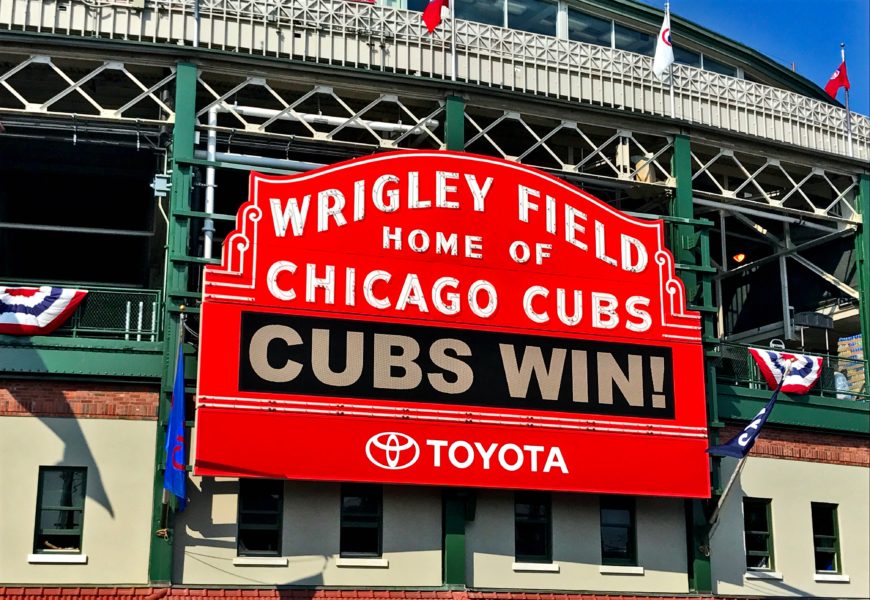Wrigley Field, Chicago. Photo courtesy of Heather Maguire/Unsplash.
For the first time in more than a century, the Chicago Cubs won the World Series, doing so by defeating the Cleveland Indians in a ten-inning Game Seven classic. After falling behind in the series three games to one, the Cubs stormed back with a nail-biting Game Five victory at historic Wrigley Field in Chicago, a resounding Game Six win back in Cleveland, and a back-and-forth Game Seven that many have called “the greatest World Series game of all time.”
At the start of the 2016 season, the Cubs were among the favorites to win it all in October, alongside the Boston Red Sox and Washington Nationals. While the Red Sox were swept out of the postseason by the American League champion Indians and the Nationals lost a two-to-one series lead against the National League runners-up Los Angeles Dodgers, the Cubs blew past the San Francisco Giants and Dodgers as they reached their first Fall Classic since the end of World War II.
Featuring talented veterans, like series Most Valuable Player Ben Zobrist and flame-throwing closer Aroldis Chapman, and young superstars, like NL MVP favorite Kris Bryant and All-Star first baseman Anthony Rizzo, the Cubs tore through their opponents with a ‘never die’ attitude. Chapman, who spent the first 30 days of the season suspended for domestic violence allegations, was called upon for 7 ⅔ innings in five games of the series, including an unheard of 5 ⅓ over his final three appearances.
However, using Chapman so often merely appeared as a counterattack against Cleveland’s skipper bullpen ace Andrew Miller. Miller, the American League Championship Series MVP, had as much work as Chapman in the series in one fewer game.
While both managers relied heavily on their bullpens throughout the series, all eyes were on the starters used in Game Seven. Cubs’ right-hander Kyle Hendricks led the National League in earned run average during the regular season, allowing nearly ⅓ of a run fewer per nine innings than his teammate and runner-up, Jon Lester. The Indians tabbed Corey Kluber, the 2014 American League Cy Young Award winner and the victor in the first and fourth games of this World Series. With a matchup of pitchers this highly-skilled, experts were calling for a low-scoring pitchers’ duel in one of the most highly anticipated games in the history of the sport.
Touted as a must-see event, the game got off to a wild start when Cubs center fielder Dexter Fowler hit Kluber’s fourth pitch of the game for a home run to center field. The Indians would retaliate in the third on a run-scoring single by designated hitter Carlos Santana. The Cubs began to wear down a clearly tired Kluber with a pair of runs in the fourth inning, and a solo home run by second baseman and NLCS MVP Javier Baez knocked him out of the game for good. Another run followed off of Miller extended Chicago’s lead to 5-1. A wild pitch by Lester, appearing in relief on short rest, brought the Indians back to within two runs, one of which was immediately gained back in the top of the sixth inning on a home run by Cubs catcher David Ross, who retired at season’s end. Chapman entered the game in relief of Lester, surrendering an RBI double and two-run homerun to center fielder Rajai Davis, tying the game at six after eight innings.
After both teams failed to score in the ninth, a brief downpour forced a seventeen-minute rain delay. As each team gathered in their respective clubhouses, Cubs right-fielder Jason Heyward called his teammates together to assess their situation: tied at six, heading to extra innings in Game Seven of the World Series. “I just had to remind everybody who we are, what we’ve overcome to get here. […] At the beginning of every day, we didn’t worry about whether we won or lost. We worried about how we were going go out there and have fun and compete,” said Heyward following the win.
The rain subsided, and the Indians took the field for the top of the tenth inning. A leadoff single by the resurgent Kyle Schwarber (who had reconstructive knee surgery in-season and returned for the series) and a fly ball by Bryant gave the Cubs a runner in scoring position with one out. Rizzo was intentionally walked, bringing up Zobrist, who delivered a two-strike RBI double to give the Cubs a lead they’d never relinquish. Another intentional walk to shortstop Addison Russell loaded the bases, and pinch-hitter Miguel Montero delivered the eventual difference-maker with an RBI single of his own. While the Indians brought the score to 8-7, in the bottom half of the inning on another hit by Davis, lefty Mike Montgomery closed out the Cubs’ first World Series championship in 108 years.
With the “Curse of the Billy Goat” finally lifted and the burden of longest title drought passed on to the Indians, the Cubs returned to Chicago on November 4th for a victory parade a century in the making, bringing together the seventh-largest single-event crowd in recorded human history. After waiting for ‘next year’ for over one hundred years, it was finally Chicago’s turn to hoist the Commissioner’s Trophy.










